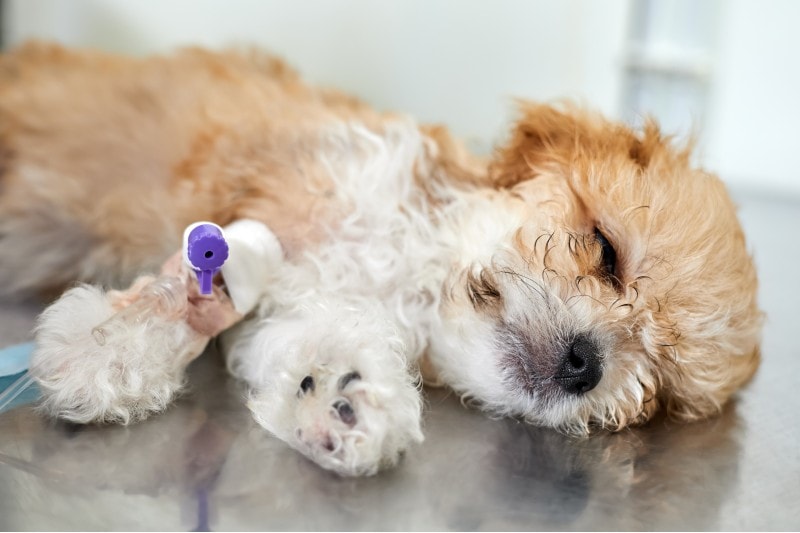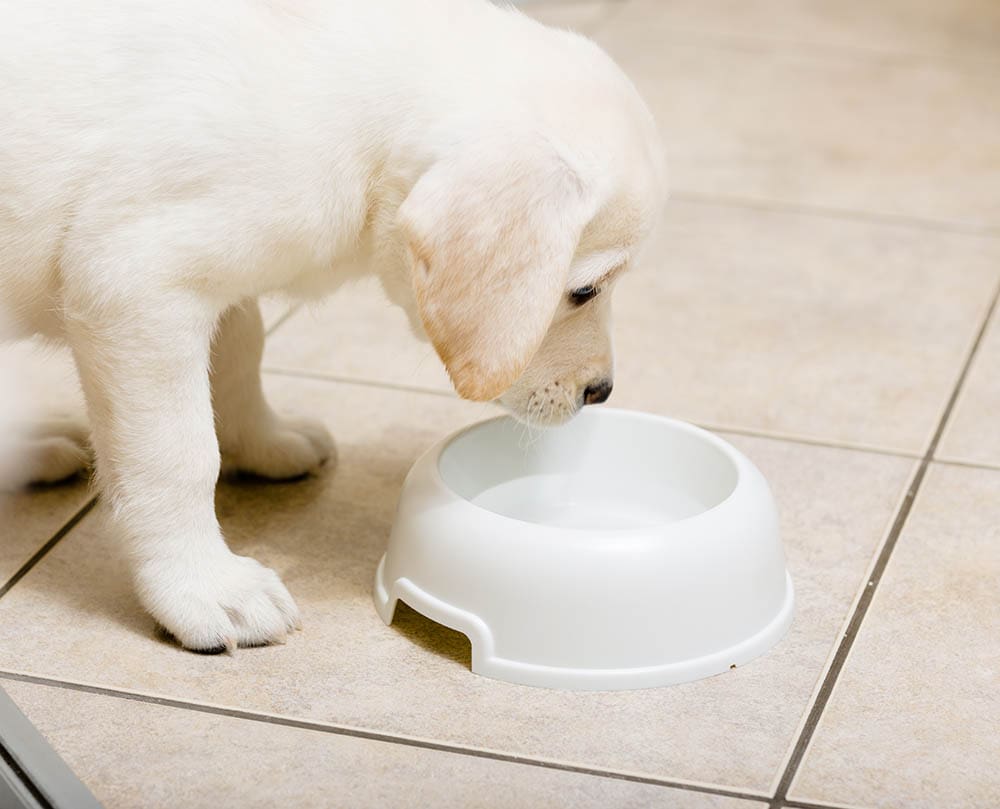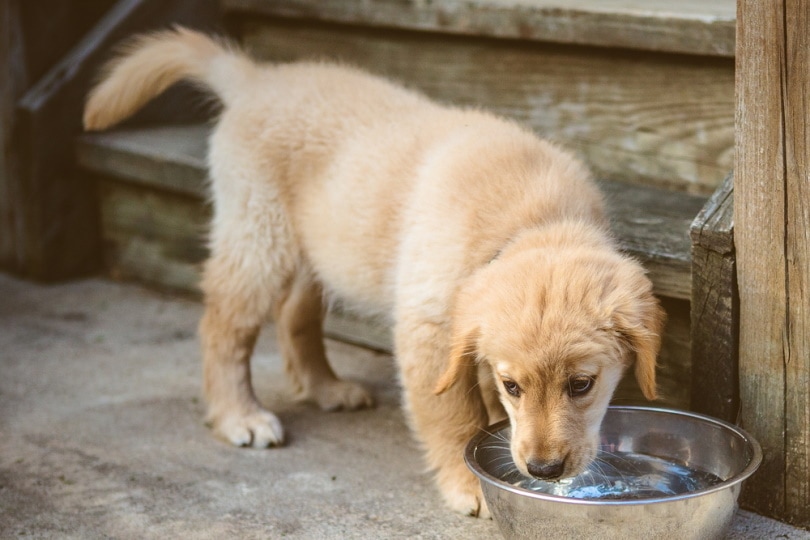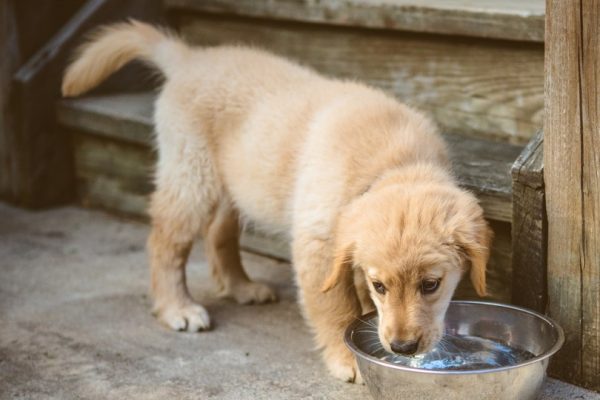Puppies need quite a bit of water to thrive. While they may not drink a lot at once, they do need regular access to water for small sips. Puppies are smaller, after all, so they don’t require huge amounts of water. Their smaller size means that they do need to drink every few hours, though.
Without water, a puppy will die of dehydration in around 72 hours. Of course, this does vary. In very moist areas, puppies may need less water. In extreme environments, dogs need more water. During the summer and winter, puppies may require more water to regulate their temperature. While dogs don’t sweat, they’ll lose water through panting.
For this reason, you should always leave water out for your puppy. In cold weather, be sure that the water isn’t frozen. Your puppy should be inside, anyway. However, if your puppy does venture outside, provide water and check for ice regularly.
If your puppy has to go a few hours without it, it isn’t a big deal. In fact, you may not want to give your puppy water while the dog is in its crate as they can spill it and soak the whole area.
What Happens When a Puppy Gets Dehydrated?
If you don’t provide your puppy with enough water, they may become dehydrated. Practically everything a dog does requires the use of liquids. Your puppy’s organs are constantly using liquid to function. Even on a mild day, your dog is using water, so it must be continually replaced. Panting on hot days uses even more water.
When your puppy isn’t drinking enough water to replace the water that has been used, they will become dehydrated. How long this takes depends on the climate, their activity level, and if any water is available at all. A reduction in body fluid will reduce blood flow and the delivery of oxygen throughout the body.
Without water, the dog will eventually die. However, other complications can occur beforehand, including seizures. Dogs may develop urinary tract problems from chronic dehydration, as well.
Because puppies are younger and more fragile, you should treat dehydration as an emergency. Minor dehydration can be treated by providing small amounts of water to your puppy to slowly bring their bodily fluid level back up. You should still contact your vet, though, as puppies are prone to complications when dehydrated.
You should contact your vet if your dog displays serious dehydration symptoms, such as shock or heatstroke.
While it may be logical to give your puppy lots of water when they’re dehydrated, this isn’t recommended. If your dog is given too much water, they may drink too fast and vomit—worsening the dehydration. Giving small amounts of water or ice chips helps your dog keep the water down so that their body can absorb it.

How to Prevent Dehydration in Puppies
If you provide your dog with water at least every few hours (though, preferably constantly), then they should drink enough to maintain their fluid balance. You should let your puppy drink as little or as much as they want. Dogs do get thirsty when their bodily fluids are low, prompting them to drink.
Providing your puppy with clean water is the best way to prevent dehydration. You should be extra certain that the water is clean and available if your puppy is outside. Check the water bowl often.
Puppies are prone to dehydration due to diarrhea and vomiting, though. Because they’re so small, they can lose water faster during an illness. If your pet has severe vomiting or diarrhea, you should contact your vet right away. Even if the underlying illness is benign, dehydration can occur and cause complications. Your vet may recommend using an IV to give the dog continuous fluids, as well as medication to prevent further fluid loss.
How to Tell if a Puppy Needs Water
If your puppy doesn’t have water, you should provide it. A puppy cannot drink too much, so there is no reason to withhold water from your canine.
You can check for dehydration in a number of ways. First, you can check the elasticity of their skin, which lessens when the dog is dehydrated. To test this, simply pull on the dog’s skin and wait for it to return to its original position. If it doesn’t do so quickly, your puppy is probably dehydrated.
Furthermore, your dog’s gums will lose lubrication when your puppy is dehydrated. You can run a finger along your dog’s gum to check their saliva. If it is thick and sticky, your puppy is probably dehydrated. Panting, fatigue, and loss of appetite are other symptoms, but they are symptoms of other illnesses too.

Can Puppies Go Through the Night Without Water?
There are many competing opinions about when puppies should be restricted from drinking while housetraining. However, practically everyone agrees that puppies do not need water at night. In many cases, the puppy will be contained to a smaller area at night. If water is provided, there is a chance it will spill and soak the puppy’s sleeping area. Plus, the puppy should be sleeping much of the night, so they shouldn’t be drinking, anyway.
Puppies are perfectly fine not drinking at night unless they have an underlying illness or problem.
However, when you should take the water away is up for debate. Some experts say that your puppy shouldn’t drink for 2–3 hours before bed, while others recommend allowing water up to bedtime.

Summary
Puppies require regular drinks just like adult dogs and humans. Because they’re smaller, they require smaller amounts of water more frequently. You should provide your puppy with water constantly—unless it is at night, or the puppy is in a crate for a short period. Dehydration can cause serious complications. However, serious dehydration is rare in puppies.
Most of the time, puppies develop dehydration due to vomiting and diarrhea. Both of these issues lead to fluid loss. When severe, the fluid loss can become dehydration. Sometimes, veterinary care is necessary at this point to prevent further complications.
Featured Image Credit to: kathleen collins, Shutterstock










